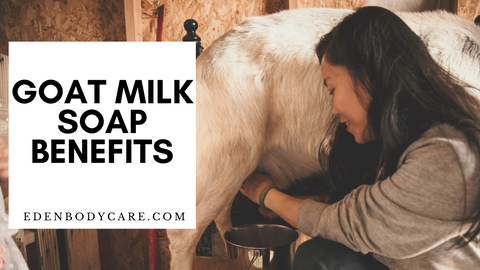Goat Milk Soap Benefits
Goat milk soap is full of AMAZING benefits for your skin, which will hydrate and condition your body but cleanse you at the same time. Most "soap" on the market shouldn’t even be called Soap but instead should be called Body Cleansers because it's actually detergent. According to the FDA, "Today there are very few true soaps on the market. Most body cleansers, both liquid and solid, are actually synthetic detergent products. Detergent cleansers are popular because they make suds easily in water and don't form gummy deposits. Some of these detergent products are actually marketed as 'soap' but are not true soap according to the regulatory definition of the word." So journey along with us to learn about these amazing benefits of real goats milk SOAP!
What Is The History Of Soap?
Did you know the Latin word for soap is "Sapo" which first appeared in Pliny the Elder's book Historia Naturalis?
Soap has been in existence since ancient Babylon. Excavation of ancient Babylon revealed that soap has been in use since 2800 BC, THAT’S ALMOST 5000 years ago! The soaping process was originally mastered by the ancient Babylonians, they used this substance to clean off wool and cotton fibers before weaving them into cloth, rather than for their hygiene. It was made by boiling leftover rendered animal fats (fatty acids) from animals with water and wood ashes (lye). They discovered that this oily substance that probably did not smell very good, helped lift away dirt, grime, and cleaned.

Later on, soap was made by big-name brands such as P&G back in the day by gathering all the leftover animal fats from private homes, butchers, and hotels for soap and candles they sold. These soaps were used as laundry detergent.
Soon, as time passed and many experiments by the P&G company were done, they started producing soap with different plant-based fat alternatives such as coconut and palm oils. This revolutionized soap as it didn't depend on animal byproducts as much anymore.
Milk was introduced to skincare in ancient Egypt and Rome and was made famous by the last Pharaoh of Ancient Egypt, Cleopatra. She was known for her beauty and skincare, historians recorded she would often bathe in milk baths using goat milk as well as donkey milk to keep her skin smooth, luscious, and healthy.
What Are The Benefits Of Goats Milk Soap?
The benefits of goat's milk soap are extensive and there are just so many good things to say about it!
Goats milk soap is easily one of the most gentle soaps out there for your skin and also delivers calcium to your skin, making it healthy and smooth. All handmade goat milk soap contains an important substance called Glycerin. In store-bought body cleansers, this special substance is stripped out to be resold as another product to then create all kinds of other products. This wonderful substance glycerin is so beneficial to the skin and is naturally occurring when making goats milk soap.
Glycerin in goat milk soap is proven to be even more hydrating to your skin than hyaluronic acid and more effective at preventing moisture loss. Another study shows glycerin to be great at improving the skin moisture levels as it acts as a barrier on your skin to shield away environmental elements. (1)(2)
Some of the other benefits of goat's milk soap are Alpha Hydroxy Acids (AHA), namely Glycolic and Lactic acid are the most promising and well researched by the FDA. These two AHAs are less likely to cause irritation to your skin, which is why goat milk soap is perfect for even the most sensitive skin types and baby skin.
Here are some of the main chemical constituents of goat's milk soap: AHAs, Vitamins A and B2, Thiamine
Alpha Hydroxy Acids (AHA) are known to:
- Exfoliate your skin. Exfoliation is when the dead skin cells on the surface of the skin shed off, making way for new skin cell generation.
- Improve any discoloration from scars and age spots as well as brightens your complexion
- Improve the appearance of fine lines and wrinkles
- Prevent acne breakouts and increase product/skincare absorption
Vitamin A is known to:
- Promoting soft and supple skin with developing tissues that keeps skin nice and firm.
- Help protect the skin from light exposure and improves overall brightness and tone of the skin because of the beta-carotenes that act as antioxidants.
- Work against the effect of aging due to the retinoids, regulating the skin cells, keeping your skin smooth and hydrated.
Vitamin B2 (Riboflavin) is known to:
- Help keep your skin from drying out by increasing the mucus secretion in your skin
- Improves signs of inflammation that causes flaring skin conditions in eczema and psoriasis and rosacea.
- Maintain the growth of skin tissues to consistently help skin regeneration for a more radiant complexity
Vitamin B1 (Thiamine) is known to:
- Help protect against harmful free radicals
- Keep your skin free from fine wrinkles and slows down signs of skin-aging
- Defends your skin from premature age-spots
There are many other important minerals in goat milk soap like Selenium, Potassium, and Magnesium. Selenium acts sort of like vitamin E. It safeguards your skin cells from free radicals and skin-damaging elements, it also plays a key role in anti-aging benefits! Potassium doesn’t get absorbed into the skin but can help enhance the moisture feel of your skin. Magnesium stabilizes any hormonal imbalance in your skin, reduces acne and breakouts, and improves the overall appearance of your skin.
Can I use goat milk soap if I am lactose-intolerant?
For those who may be wondering "Can I use goats milk soap if I was allergic to milk and dairy products?"
In general, while milk enzymes and acids are released into your skin during soap use, the actual components stay on the outside (external) to your digestive system and will never pass into your intestinal tract. Milk that is used in soap has no direct relation to lactose-intolerance and allergic reactions on the skin from the usage of goat milk soap, this is almost unheard of.
According to our reviews, we have had customers who made known to us they were lactose-intolerant, used our products, and have had no issues at all with allergic reactions. Our answer is yes, however, please do your own research and take precautions as we are not doctors after all. Try a sample on a small patch of your skin to really make sure before you purchase a box full of goat's milk soap.
"Is goats milk soap hypoallergenic?"
This raises many questions and opens up a whole box of gummy worms. As we study the word hypoallergenic, we come to find out that it has no regulations and products do not need to be tested to be labeled as such. The FDA says "There are no Federal standards or definitions that govern the use of the term "hypoallergenic." The term means whatever a particular company wants it to mean. Manufacturers of cosmetics labeled as hypoallergenic are not required to submit substantiation of their hypoallergenicity claims to the FDA."
Also, as said by WebMd, "If a cosmetic is labeled "hypoallergenic," it usually means the makers of the product claim that it causes fewer allergic reactions than other products. That doesn't mean that it is allergy-proof or gentler for your skin."
Some labels on "hypoallergenic" skincare contain ingredients such as: water, glycerin, petrolatum, stearic acid, glycol stearate, dimethicone, isopropyl isostearate, dihydroxypopyltrimonium chloride, hydroxyethyl urea, tapioca starch, cetearyl alcohol and so much more. Now although many people are allergic to certain oils such as olive oil or coconut oil, there are other alternatives to skin care than using a name brand "hypoallergenic" product made with these ingredients!
Conclusion

Goats milk has been used since the beginning of time, the ancients knew of its amazing benefits to their skin. Goats milk soap contains all the nutrients, minerals, and skin-nourishing benefits you need all in one single bar of soap.
Goat's milk soap provides so many incredible benefits to our skin, once you use it you won’t be able to deny its extra creaminess from the fatty acids providing our skin with moisturization and softens our skin every time we wash. It cleanses gently but deeply so it is not harsh on our skin and also soothes itchiness and inflammation that occurs in sensitive skin from conditions such as psoriasis and eczema. It is rich in Vitamin A which helps control acne and reduces wrinkles, it contains AHAs that assist in anti-aging and helps exfoliate dead skin cells, promotes collagen production, brightens skin, and reduces the appearance of fine lines and wrinkles on your skin.
All of them play key roles and work symbiotically to enhance the look, feel and overall youthfulness of your skin naturally, which is why goats milk soap is the bomb and everyone should try it out!
If you enjoyed this article, please don’t forget to subscribe to our newsletters, share it with your friends, or pin for later!
If you have never tried goat's milk soap, we recommend these to try:
Oatmeal & Honey - An all time Best Seller
The Classic - Unscented goat milk soap


